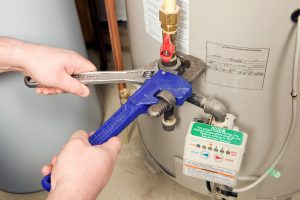 Water heaters are built to last, even under extreme pressure. Which is good, because the water heater is one of the hardest working appliances in the average home. If you have a tank water heater, as most people do, then your system never really turns off. It operates in some capacity at all times, 24/7, in order to maintain a standing supply of hot water for whenever you need it. All that use can create a lot of problems over the years, which is why it’s a good idea to make sure you’re familiar with the warning signs that you need to call for repairs.
Water heaters are built to last, even under extreme pressure. Which is good, because the water heater is one of the hardest working appliances in the average home. If you have a tank water heater, as most people do, then your system never really turns off. It operates in some capacity at all times, 24/7, in order to maintain a standing supply of hot water for whenever you need it. All that use can create a lot of problems over the years, which is why it’s a good idea to make sure you’re familiar with the warning signs that you need to call for repairs.
What common problems should I know about with my water heater?
- Low hot water output may signal a clogged burner, sediment buildup, or a faulty thermostat, all of which require professional attention.
- Sudden changes in water temperature, such as hot water turning cold abruptly, often result from a damaged dip tube, which allows cold water to mix before it’s fully heated.
- Discolored or rusty water indicates corrosion inside the tank or pipes, which may require flushing or tank replacement.
- Unusual noises like rumbling or popping often stem from mineral buildup at the bottom of the tank, reducing efficiency and increasing energy use.
- Water leaks near the base or around fittings may suggest structural issues or loose connections that need urgent repair or replacement.
Consistently Low Output
Putting enough demand on your water heater for a long enough period of time will eventually overwhelm it. However, you should start to become concerned if your water heater is consistently failing to provide enough hot water to meet demand. There could be a number of different reasons why your water heater is not providing enough hot water.
If you’re using a gas water heater, it’s possible that the burner assembly is clogged. This happens over time, due to a buildup of leftover carbon particles as a byproduct of combustion. Professional cleaning should fix the problem, in that case. It’s also possible that you have a buildup of sediment in the bottom of the tank, insulating the water inside from the heat the system is producing.
Finally, it’s possible that you just have a problem with the system’s thermostat. It’s always a good idea to check the water heater’s thermostat if you’re having output issues, to make sure that it’s set properly. If it seems to be malfunctioning, have a professional examine it as quickly as possible.
Sudden Changes in Water Temperature
If your water heater can’t seem to decide whether to send you hot or cold water, you may have a problem with the dip tube. In tank water heaters, the dip tube is a plastic tube that runs from the water line at the top of the tank to the bottom. All water that flows into the water heater moves through the dip tube, and is released near the bottom of the tank.
There are two reasons why the dip tube exists. The first is that it prevents fresh, cold water from mixing with the warm water at the top of the tank. The second is that it directs incoming water to the part of the tank closest to the heat source, where it will warm up the fastest. If the dip tube cracks or breaks, which can happen, cold water from the water line will mix directly with the hot water leaving the system. This can cause sudden shifts in temperature as the water is leaving the faucet. Fortunately, it’s fairly easy for a professional to replace the dip tube.
Frequently Asked Questions
Question: What does “consistently low output” from a water heater mean?
Answer: It means your heater persistently fails to supply enough hot water even under normal demand. Common causes include a clogged burner in gas heaters, sediment buildup at the tank bottom, or thermostat issues.
Question: Why might my water temperature fluctuate between hot and cold unexpectedly?
Answer: Fluctuating water temperatures often point to a broken dip tube inside the tank. The dip tube delivers cold water to the bottom for heating. If it cracks, cold water can mix with the hot, causing sudden temperature changes.
Question: Should any leak from my water heater worry me?
Answer: Yes, no leak should be ignored. Even a small drip can get worse over time. Leaks near the tank or internal components often signal a serious issue that may require repair or even full replacement.
Question: What proactive steps can help me avoid water heater issues?
Answer: Watching for warning signs like reduced hot water, shifting temperatures, or visible leaks is key. Regular professional maintenance can help catch small issues early and extend the lifespan of your water heater.
Carney Plumbing Heating & Cooling provides comprehensive water heater repair services in North Wales, PA. If you have a problem with your water heater, contact us today to schedule an appointment with one of our expert technicians.

